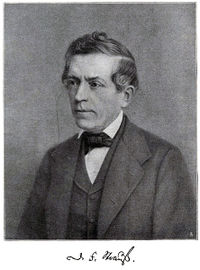Difference between revisions of "Category:Historical Jesus Studies--1800s"
| Line 1: | Line 1: | ||
[[File:David Friedrich Strauss.jpg|thumb|200px|David Friedrich Strauss]] | [[File:David Friedrich Strauss.jpg|thumb|200px|David Friedrich Strauss]] | ||
* [[:Category:Historical Jesus Studies|BACK to the HISTORICAL JESUS STUDIES--INDEX]] | |||
* [[:Category:Made in the 1800s|BACK to the MADE IN THE 1800s--INDEX]] | |||
'''Historical Jesus Studies in the 1600s--Works and Authors''' | |||
==Overview== | ==Overview== | ||
At the beginning of the 19th century the first critical approaches to the Life of Jesus were characterized by the attempt either to "eliminate" the supernatural elements in the Gospel narratives (Jefferson) or to "explain" them in rationalistic terms (Paulus). The breakthrough came with the work of Strauss (1835) who showed that the Gospel narratives ought not to be taken as "objective" reports but as "mythological" retelling of historical events. Strauss defined what would become the "scholarly" approach; the success of his work marked the beginning of contemporary research on the Historical Jesus. The Emancipation of the Jews in Western Europe led to the emergence of Jewish scholarship and Joseph Salvador was in 1838 the first Jewish scholar to deal with the historical Jesus. | At the beginning of the 19th century the first critical approaches to the Life of Jesus were characterized by the attempt either to "eliminate" the supernatural elements in the Gospel narratives (Jefferson) or to "explain" them in rationalistic terms (Paulus). The breakthrough came with the work of Strauss (1835) who showed that the Gospel narratives ought not to be taken as "objective" reports but as "mythological" retelling of historical events. Strauss defined what would become the "scholarly" approach; the success of his work marked the beginning of contemporary research on the Historical Jesus. The Emancipation of the Jews in Western Europe led to the emergence of Jewish scholarship and Joseph Salvador was in 1838 the first Jewish scholar to deal with the historical Jesus. | ||
Revision as of 01:33, 28 July 2014
Historical Jesus Studies in the 1600s--Works and Authors
Overview
At the beginning of the 19th century the first critical approaches to the Life of Jesus were characterized by the attempt either to "eliminate" the supernatural elements in the Gospel narratives (Jefferson) or to "explain" them in rationalistic terms (Paulus). The breakthrough came with the work of Strauss (1835) who showed that the Gospel narratives ought not to be taken as "objective" reports but as "mythological" retelling of historical events. Strauss defined what would become the "scholarly" approach; the success of his work marked the beginning of contemporary research on the Historical Jesus. The Emancipation of the Jews in Western Europe led to the emergence of Jewish scholarship and Joseph Salvador was in 1838 the first Jewish scholar to deal with the historical Jesus.
Pages in category "Historical Jesus Studies--1800s"
The following 28 pages are in this category, out of 28 total.
1
- La passione di Gesù Cristo (The Passion of Jesus Christ / 1800 Caruso / @1783 Paisiello), Perugia production (oratorio)
- Natürliche Geschichte des grossen Propheten von Nazareth (Natural History of the Great Prophet of Nazareth / 1800-02 Venturini), book
- La resurrezione di Gesù Cristo (1804 Weigl), oratorio
- La passione di Gesù Cristo (The Passion of Jesus Christ / 1811 Morlacchi / @1730 Metastasio), oratorio (music), Dresden premiere
- Storia della vita di Gesù Cristo (1812 Pertusati) = Histoire de la vie de Jesus-Christ (History of the Life of Jesus Christ / 1786-88 Compans), book (Italian ed.)
- Gerusalemme distrutta (1812 Dusik), oratorio
- Vita di Gesù Cristo e della sua religione (Life of Jesus Christ and His Religion / 1817 Cesari), non-fiction
- (+) The Life and Morals of Jesus of Nazareth (1820 Jefferson), book
- Vita e dottrina di Gesù Cristo (1822 Stolberg / Antici), non-fiction (Italian ed.)
- Salathiel (1827 Croly), novel
- Christus (Christ / 1827-28 Neukomm), oratorio
- Christus (Christ / 1827-38 Schneider), oratorio
- Das Leben Jesu: nach akademischen Vorlesungen (Life of Jesus: A Manual for Academic Study / 1829 Hase), book
- Traditions of Palestine (1830 Martineau), novel
- The Book of Mormon (1830 Smith), vision
- Parafrasi dei quattro Evangeli posti in armonia (1831-39 Barcellona), book
- Das bittere Leiden unseres Herrn Jesu Christi (1833 Emmerich, Brentano), vision
- Le sette ultime parole di Nostro Signore Gesù Cristo (1838 Mercadante), oratorio
- Jésus-Christ et sa doctrine (1838 Salvador), book
- Vie de Jésus; ou, Examen critique de son histoire (1839-40 Littré) = Das Leben Jesu: kritisch bearbeitet (The Life of Jesus: Critically Examined / 1835-36 Strauss), book (French ed.)
- Die christliche Lehre von der Dreieinigkeit und Menschwerdung Gottes in ihrer geschichtlichen Entwicklung (1841-43 Baur), book
- Julian; or, Scenes in Judea (1841 Ware), novel
- The Life of Jesus: Critically Examined (1846 Strauss), book (English ed.)
- Il perfetto leggendario; ovvero, Storia della vita di Gesù Cristo (History of the Life of Jesus Christ / 1847-50 Lorini), non-fiction
- Wichtige, historische Enthüllungen über die wirkliche Todesart Jesu (1849 Venturini), arch-fi book
Media in category "Historical Jesus Studies--1800s"
The following 3 files are in this category, out of 3 total.
- 1803 * Beethoven (oratorio).jpg 300 × 425; 9 KB
- 1828 Paulus.jpg 907 × 1,360; 72 KB
- 1835 * Strauss.jpg 765 × 1,261; 248 KB



